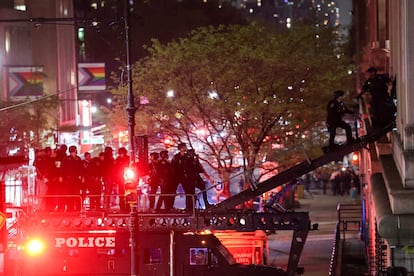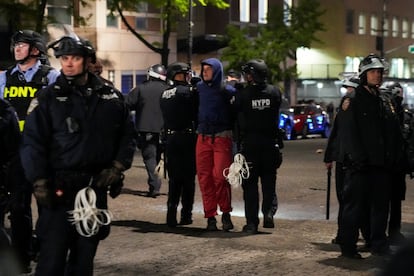New York police clear building occupied by pro-Palestinian protesters at Columbia
Officers have swept through other campuses across the US over the last two weeks, leading to confrontations and more than 1,100 arrests in at least 20 states


Streets closed off to traffic in a wide perimeter around Columbia University and the deployment of hundreds of special operations police officers on Tuesday were signs that a forceful eviction of pro-Palestinian protesters was imminent. After a day of tense calm punctuated by student concentrations in support of the protesters who had locked themselves up inside Hamilton Hall, an administrative campus building, hundreds of NYPD officers were deployed outside the main entrance to the campus of the elite university at 7 p.m., ready to intervene.
At around 9:15 p.m., the police entered the premises. Between 30 and 40 officers climbed up a ladder and entered the occupied building through an upper floor window. Hamilton Hall, which has a history of student occupations, was cleared before dawn on Wednesday and dozens of students were arrested without putting up any resistance.
Elsewhere, arrests were also made at the nearby City College of New York, where demonstrators were in a standoff with police outside the public college’s main gate. And across the country, clashes broke out overnight between dueling groups at the protest encampment at the University of California, Los Angeles. Police have swept through other campuses across the U.S. over the last two weeks, leading to confrontations and more than 1,100 arrests in at least 20 states.
While the specialized officers approached Columbia’s Morningside campus on foot from adjacent streets, the university’s Emergency Management Operations team urged students to shelter in place due to increased activity on the Morningside campus. Failure to comply could result in disciplinary action, they warned. The NYPD issued the same notice to students living in one of the seven residence halls on campus.

The occupation of Hamilton Hall by a so-called “autonomous group” made up of dozens of protesters early on Tuesday seems to have changed the mind of the Columbia governing board, which until now had ruled out resorting to the police again to restore order on the premises. The police must be specifically asked to intervene and cannot do so on their own decision. Two weeks ago the NYPD was called in to dismantle the first Gaza solidarity encampment, which ended in around 100 arrests.
Columbia published the letter sent by President Nemat Minouche Shafik to the NYPD on April 30 to request help. “The events on campus last night have left us no choice. With the support of the University’s Trustees, I have determined that the building occupation, the encampments, and related disruptions pose a clear and present danger to persons, property, and the substantial functioning of the University and require the use of emergency authority to protect persons and property,” wrote the president. “With the utmost regret, we request the NYPD’s help to clear all individuals from Hamilton Hall and all campus encampments.”
The students barricaded in Hamilton Hall had renamed the building Hind’s Hall in memory of Hind Rajab, a Palestinian five-year-old girl who died alone, among corpses, begging for help for hours after the vehicle in which she was traveling was hit by Israeli fire. In an update sent by the university, officials warned that “students occupying the building face expulsion.” They also said that “this is about responding to the actions of the protesters, not their cause.”
The nationwide protests, which were initiated at Columbia and quickly spread to other universities from coast to coast, is reminiscent of the outcry against the Vietnam War and, as those protests did in 1968, it is now affecting the political sphere. Pressure has come not only from Republican members of Congress — the Speaker of the House, Mike Johnson, visited the campus last week in support of Jewish students — but also from some Democrats ahead of the presidential election in November, with the protests threatening to cost President Joe Biden even more support at the polls.
Sign up for our weekly newsletter to get more English-language news coverage from EL PAÍS USA Edition
Tu suscripción se está usando en otro dispositivo
¿Quieres añadir otro usuario a tu suscripción?
Si continúas leyendo en este dispositivo, no se podrá leer en el otro.
FlechaTu suscripción se está usando en otro dispositivo y solo puedes acceder a EL PAÍS desde un dispositivo a la vez.
Si quieres compartir tu cuenta, cambia tu suscripción a la modalidad Premium, así podrás añadir otro usuario. Cada uno accederá con su propia cuenta de email, lo que os permitirá personalizar vuestra experiencia en EL PAÍS.
¿Tienes una suscripción de empresa? Accede aquí para contratar más cuentas.
En el caso de no saber quién está usando tu cuenta, te recomendamos cambiar tu contraseña aquí.
Si decides continuar compartiendo tu cuenta, este mensaje se mostrará en tu dispositivo y en el de la otra persona que está usando tu cuenta de forma indefinida, afectando a tu experiencia de lectura. Puedes consultar aquí los términos y condiciones de la suscripción digital.








































